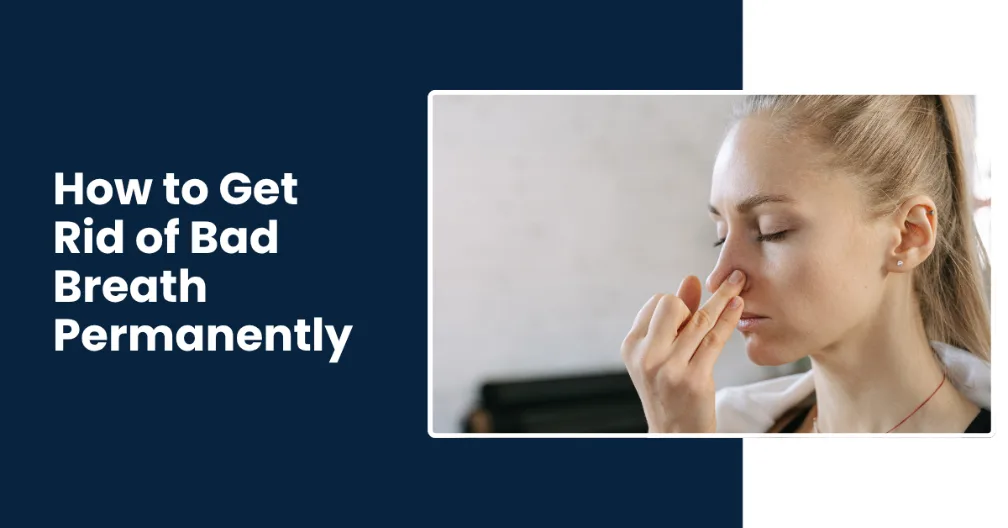Bad breath can be uncomfortable and sometimes embarrassingAlmost everyone experiences it at some point, and it isn’t always related to poor oral hygiene. In many cases, an underlying medical or dietary issue may be responsible. If you are still popping a mint candy to get rid of bad mouth odor, this guide will help you understand what’s really happening.
To get rid of unpleasant breath for good, it’s important to know why it occurs. Below, we break down the most common causes of bad-smelling breath, how to prevent it, and the professional treatments that actually work.
How to Get Rid of Bad Breath?
Before you treat foul-smelling breath, it is important to know whether you actually have it and what is causing it. Here’s how you can tell if your breath stinks.

Diagnosis
Sometimes it can be difficult to tell if your breath smells unpleasant. A quick self-check can help. Try smelling your used dental floss or tongue scraper. If it has an unpleasant odor, you may have bad breath.
When a self-check is not clear, visit your dentist for a more accurate evaluation. They may use tools such as a halimeter or chemical detection test to identify odor compounds and determine the cause.
Bad Breath Symptoms and Causes
Certain foods can leave a temporary smell, but if bad breath persists, it may indicate a condition known as halitosis.
Aside from poor oral hygiene, chronic bad breath can result from dry mouth (xerostomia), tongue coating, or bacterial buildup that releases volatile sulfur compounds. These compounds are produced by anaerobic bacteria that thrive in areas such as the tongue, tonsils, and periodontal pockets.
Other causes include gum disease, respiratory infections, smoking, diabetes, digestive issues, and other medical conditions. When bad breath continues even with regular cleaning, it is best to see a dentist for a professional assessment and evaluation of your oral microbiome and saliva flow.
Bad Breath Treatment and Prevention
Halitosis can be uncomfortable, but it can be treated once the cause is identified. The first step to improving breath freshness is understanding what triggers it.
Professional Treatments
If bad breath is caused by plaque, tartar, or gum disease, a professional dental cleaning removes bacteria and volatile sulfur compounds that produce odor. Dentists may also suggest an antibacterial mouthwash that targets anaerobic bacteria and helps rebalance the oral microbiome.
Scaling and root planing (deep cleaning) is the most effective solution when gum disease is present. For xerostomia (dry mouth), saliva-boosting products and proper hydration help restore salivary flow and reduce odor.
Daily Care and Prevention
At home, brush twice a day using a fluoride toothpaste and clean your tongue with a scraper to remove tongue coating. This eliminates odor-causing debris rather than just masking it.
Chewing sugar-free gum or using xylitol mints can increase saliva and freshen breath naturally. Avoid caffeine, alcohol, and smoking, as these reduce moisture and allow odor-causing bacteria to multiply.
Regular dental visits and consistent oral hygiene protect your mouth from periodontal pockets, bacterial buildup, and chronic halitosis. Together, professional care and simple daily habits keep your breath clean and your mouth healthy.
Home Remedies for Halitosis
If bad breath occurs occasionally, the simple home remedies we recommend will help keep your mouth fresh. These natural methods are tested personally by us and are easy to follow and support your daily oral care routine.
Good Oral Hygiene
Brush your teeth twice a day, use floss, and a tongue scraper daily to eliminate mouth odor. A fluoride toothpaste is best for maintaining good oral health.
Try Natural Mouth Fresheners
Make it a habit to take mint, parsley, fennel, or anise seeds after a meal. They will help you get rid of bad odor permanently. You can also drink green and peppermint teas. They target smell-causing compounds and boost saliva production, which will improve your breath freshness.
Zinc for Halitosis
If your breath smells or you have a dry mouth, use zinc salt mouthwashes and chewing gums. This active ingredient binds and neutralises sulfur compounds that cause unpleasant odor.
Eat Yogurt Daily
Having yogurt is an effective home remedy to improve your gut health and prevent bacterial growth in the mouth. The probiotics in it will balance your oral bacteria, ultimately reducing bad smells.
Homemade Mouthwashes
You can also get rid of foul breath smell with baking soda and vinegar. To prepare baking soda mouthwash at home, mix 2 teaspoons of it in a cup of lukewarm water. Rinse your mouth with it for thirty seconds to kill odor-causing bacteria.
To freshen up your breath with a vinegar mouthwash, add 2 tablespoons of white or apple cider vinegar to a cup of water. Gargling with this mildly acidic solution will stop bacterial growth and eliminate bad smell.
Fruits and Juices
Add juicy fruits to your diet, like apples and oranges. They boost saliva production that neutralizes foul-smell-causing compounds and bacteria.
Water Intake
The major cause of breath odor is dry mouth. The morning breath smell is also due to this reason. Staying hydrated will help you limit bacterial growth that causes odor while you sleep or when your mouth is dry.
How to Prevent Halitosis
- Brush your teeth twice a day, floss once, and clean your tongue to remove odour-causing bacteria.
- Rinse dentures, retainers, and bridges daily to prevent plaque and decay.
- Stay hydrated to avoid xerostomia (dry mouth).
- Limit coffee, alcohol, and smoking, which reduce saliva and increase odour.
- Eat fruits and fibre-rich foods that promote salivary flow and clean your mouth naturally.
- Schedule regular dental cleanings to manage periodontal pockets and bacterial buildup.
Related Guides:
- The Complete Guide to Teeth Cleaning
- What Causes Cavities and How to Prevent Them
- Benefits of Professional Teeth Cleaning
FAQs
How to get rid of bad breath quickly?
To freshen your breath fast, follow proper oral hygiene daily and drink plenty of water to get rid of odour-causing bacteria.
Why does my breath stink so bad?
Bacterial buildup causes your breath to smell when you skip brushing and flossing. So, to keep it fresh, keep your mouth clean.
What kills bad breath from the stomach?
If digestive issues are causing mouth odor, avoid food that triggers the smell and consume probiotic-rich dietary items. It will improve your gut health and balance stomach bacteria.

